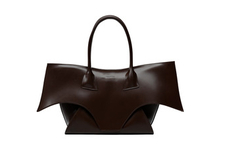
Risa Vancouver Partners with Indian Artisans for Sustainable Bags
Grace Mahas — November 20, 2024 — Eco
References: risavancouver
Risa Vancouver, founded by sisters Riddhima and Saloni Sayal, is redefining sustainable luxury through its ethical leather handbag production model. The brand combines Vancouver-based design with traditional craftsmanship from its private atelier in India, where female artisans create each piece by hand. The company's commitment to sustainability is evident in its use of top-grade, upcycled leather, which helps reduce industry waste while maintaining premium quality standards.
Beyond its environmental initiatives, Risa Vancouver's business model focuses on female empowerment and fair trade practices. The brand provides its artisans with opportunities for financial independence and skill development, while creating a transparent supply chain that connects customers directly with their bag's creator. This approach exemplifies a growing trend in the fashion industry where brands are prioritizing both ecological responsibility and social impact, allowing consumers to make purchases that align with their values.
Beyond its environmental initiatives, Risa Vancouver's business model focuses on female empowerment and fair trade practices. The brand provides its artisans with opportunities for financial independence and skill development, while creating a transparent supply chain that connects customers directly with their bag's creator. This approach exemplifies a growing trend in the fashion industry where brands are prioritizing both ecological responsibility and social impact, allowing consumers to make purchases that align with their values.
Trend Themes
1. Sustainable Luxury - Brands are merging high-end design with environmental stewardship by using upcycled materials to lessen industry waste.
2. Female Artisan Empowerment - Businesses are focusing on empowering women through fair trade practices and financial independence within traditional craftsmanship sectors.
3. Transparent Supply Chains - Companies are creating direct connections between customers and artisans to build trust and showcase ethical production methods.
Industry Implications
1. Eco-friendly Fashion - The fashion sector is increasingly adopting sustainable practices to minimize environmental impact while maintaining quality.
2. Handmade Accessories - The rise of handmade accessories reflects a consumer shift towards unique, ethically produced goods.
3. Fair Trade Goods - Fair trade goods are gaining traction as more businesses prioritize equitable treatment and financial stability for workers.
10
Score
Popularity
Activity
Freshness























